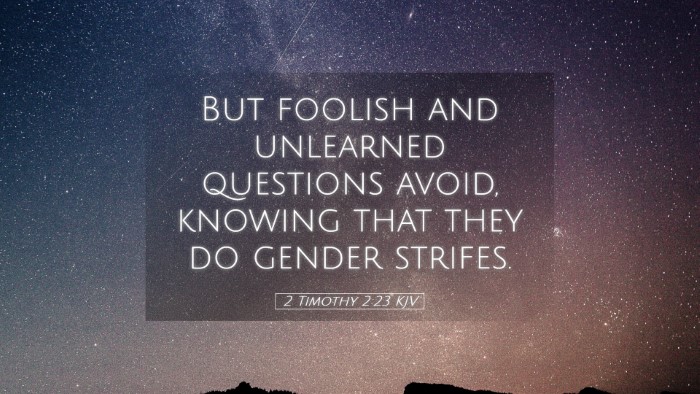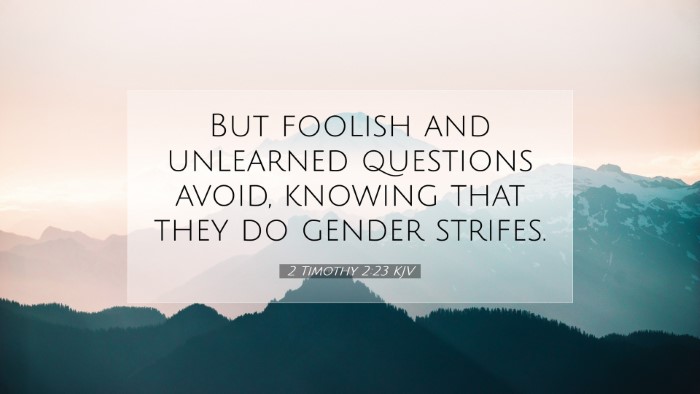Commentary on 2 Timothy 2:23
Bible Verse: "But foolish and unlearned questions avoid, knowing that they do gender strifes." (2 Timothy 2:23, KJV)
Introduction
This verse is a pastoral admonition from the Apostle Paul to Timothy, his protégé. As a young pastor, Timothy faced the challenge of dealing with diverse teachings and potentially divisive questions within the church. Parsing this verse in light of historical and theological contexts reveals vital insights for pastors, students, and scholars alike.
Contextual Analysis
In the context of 2 Timothy, Paul writes to encourage Timothy amidst persecution and false teachings. The verses surrounding 2 Timothy 2:23 provide implications for proper conduct and ministry focus in a tumultuous environment.
Focus on the Essentials
Paul emphasizes the importance of maintaining doctrinal integrity. Timothy is encouraged to focus on maintaining sound teaching, thereby implicitly advising against distractions.
The Nature of Questions
The term "foolish and unlearned" indicates questions that lack substance and provoke strife. Such inquiries do not lead to enlightenment or spiritual growth but instead create discord among the believers.
Insights from Public Domain Commentaries
Matthew Henry's Commentary
Henry characterizes these "foolish and unlearned" questions as speculative or trivial issues that often arise in ecclesiastical debates. He urges believers to be cautious of discussions that divert energy away from the core message of the Gospel.
- Strife Gendering: Engaging in such debates often leads to quarrels that can fracture the unity of the church.
- Practical Wisdom: Henry advocates for a practical wisdom that recognizes which discussions are beneficial and which are merely contentious.
Albert Barnes' Notes on the Bible
Barnes elaborates on the admonition to "avoid" these questions. He interprets this as a directive to choose the battles one engages in, emphasizing the authority bestowed upon Timothy as a leader who must protect the integrity of his ministry.
- Consequences of Engagement: Barnes notes that engaging in frivolous debates can lead to unnecessary strife within church circles.
- Doctrine Over Distraction: He underscores the necessity of prioritizing sound doctrine over disputes that have no real value in spiritual edification.
Adam Clarke's Commentary
Clarke's commentary highlights the importance of discernment in ministry. He cautions against the allure of engaging in intellectual arguments that do not advance faith. His analysis extends to the characteristics of a mature Christian who knows when to engage and when to refrain.
- Folly in Debate: Clarke remarks that many questions stem from ignorance or pride rather than a genuine desire for understanding.
- Encouraging Edification: He advises that a pastor should focus on questions that promote growth and unity, rather than division.
Theological Implications
2 Timothy 2:23 serves as a reminder of the need for theological discernment. Engaging with individuals or groups that pursue trivial matters can draw church leaders away from their primary calling to instruct, correct, and encourage their congregations in sound doctrine.
Unity in Diversity
In a time when theological diversity can lead to strife, this verse challenges believers to seek unity through substantive discussions centered on Christ. It is essential for pastors and leaders to create an atmosphere where mature and meaningful conversations take place.
The Role of the Pastor
Pastors are tasked with shepherding their congregations effectively, which includes identifying and avoiding distractions. This involves cultivating a deep understanding of Scripture and knowing how to guide discussions that strengthen rather than weaken the faith community.
Practical Applications
Leaders and scholars can apply the insights from this commentary in several practical ways:
- Discerning Discussions: Evaluate which questions and topics contribute to growth versus those that lead to arguments.
- Teaching Strategy: Implement teaching strategies that encourage meaningful engagement on complex theological issues.
- Promoting Peace: Foster a culture of peace where church members feel safe to explore their faith without engaging in divisive conversations.
Conclusion
2 Timothy 2:23 underscores the necessity of discernment in ministry. Paul’s exhortation to Timothy to avoid foolish discussions holds vital relevance for contemporary church leadership. By cultivating an environment that encourages constructive dialogue while steering clear of strife-inducing topics, pastors can significantly influence their congregations toward greater unity and faithfulness.


